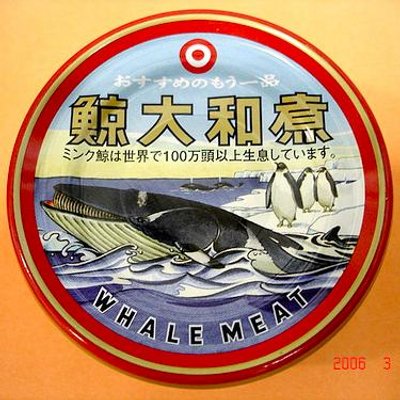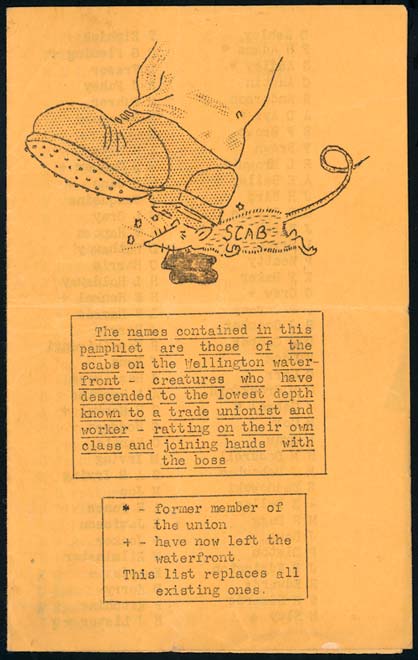The Whaledump tradition
Over the last week the hacktivist known as Whaledump has dominated New Zealand politics by exposing the links between the National government and sleazy bloggers like Cameron Slater. After initially feeding documents to Nicky Hager, who turned them into a lucid narrative of corruption and intimidation, Whaledump has decided to make his or her electronic loot available to us all on the internet.
Both supporters and detractors have presented Whaledump's campaign as a radical innovation in New Zealand politics. Rodney Hide expressed the popular view when he told Radio Live yesterday that "we've never seen anything like" Whaledump in New Zealand, and claimed that his or her campaign "had only been made possible" by "new technology".
Whaledump may be using twenty-first century technology to torment the National government, but the hacktivist's strategy of discovering and sharing the dirty secrets of the powerful has a venerable history in New Zealand politics. What Whaledump does with an internet connection and a filesharing site, earlier activists did with notebooks, printings presses, and pirate radio.
Whaledump's campaign can be compared, in its intensity and ingenuity, with the propaganda war waged in illegal pamphlets and on pirate radio by supporters of New Zealand's wharfies in 1951, during what some historians have taken to calling the Great Waterfront Lockout.
After Sid Holland's National government kicked members of the powerful and unashamedly socialist Waterside Workers Union out of their workplaces at the beginning of 1951, the wharfies' allies in the coal mines, freezing works, and railyards went on strike. Holland tried to break his opponents by declaring that New Zealand was 'at war', and announcing 'emergency regulations' that banned workers from marching in the streets, publishing their views, or even giving food to the wives and children of wharfies.
Holland's crusade had been urged by a paranoid United States, which feared that communist members of New Zealand's trade unions might be about to seize power and make their country a South Pacific satellite of the Soviet Union. Holland had another ally in Fintan Patrick Walsh, the leader of the Seaman's Union, who was known as the 'Black Prince' because of his fondness for violence and his dodgy business practices.
Instead of being intimidated by the suspension of their civil rights, the wharfies and their allies quickly published more than a score of pamphlets and bulletins that condemned the authoritarianism and corruption of the National regime and its helpers. These broadsides could not be sold openly, but were passed from hand to hand in union halls and pubs up and down New Zealand.
One of the strikers' pamphlets was particularly shocking, and particularly popular. If It's Treachery Get Tuohy was an expose of Fintan Patrick Walsh, whose birth name was Patrick Tuohy. The pamphlet showed that Walsh, who supposedly lived on the modest salary of a union official, had used a combination of thuggery and political connections to acquire all sorts of riches, including an enormous dairy farm in the Wairarapa. Pamphlets like If It's Treachery Get Tuohy were complemented by a pirate radio station that began to broadcast from the mountains outside Wellington.
After defying the New Zealand state for five months, the Waterside Workers Union finally admitted defeat in the middle of 1951. When a gleeful Sid Holland responded by calling a snap election, National won a record 51% of the vote. The wharfies had won considerable support in the working class suburbs of New Zealand's big cities and in coal mining and hydro station towns, but they had bewildered and frightened the farming communities that traditionally back the National Party. Because of Holland's emergency regulations and the limitations of print media, documents like If It's Treachery Get Tuohy, with their revelations of the corruption of the National government and its allies, never reached the eyes of many New Zealanders.
There are, of course, big differences between the political situation in 1951 and the situation today. Whaledump is not the spearhead of any militant working class movement, and the spectre of communism does not haunt John Key. But similarities exist amidst the differences. Key's use of Cameron Slater to intimidate his opponents recalls Sid Holland's distaste for dissent, and one of the persistent targets of Slater's blog has been the Maritime Union of New Zealand, the direct descendant of the Waterside Workers Union that fought so hard against National in 1951.
By sharing the dirty secrets of the National Party and its allies, Whaledump is following in the tradition of the anonymous trade unionists who defied the law to write, publish, and distribute polemics like If It's Treachery Get Tuohy in 1951. Today, though, Whaledump has technology that makes his or her revelations available instantly to a huge majority of New Zealanders, regardless of where they live and what politics they hold. The sort of propaganda battle that was lost in 1951 may be won in 2014.
[Posted by Scott Hamilton]
Both supporters and detractors have presented Whaledump's campaign as a radical innovation in New Zealand politics. Rodney Hide expressed the popular view when he told Radio Live yesterday that "we've never seen anything like" Whaledump in New Zealand, and claimed that his or her campaign "had only been made possible" by "new technology".
Whaledump may be using twenty-first century technology to torment the National government, but the hacktivist's strategy of discovering and sharing the dirty secrets of the powerful has a venerable history in New Zealand politics. What Whaledump does with an internet connection and a filesharing site, earlier activists did with notebooks, printings presses, and pirate radio.
Whaledump's campaign can be compared, in its intensity and ingenuity, with the propaganda war waged in illegal pamphlets and on pirate radio by supporters of New Zealand's wharfies in 1951, during what some historians have taken to calling the Great Waterfront Lockout.
After Sid Holland's National government kicked members of the powerful and unashamedly socialist Waterside Workers Union out of their workplaces at the beginning of 1951, the wharfies' allies in the coal mines, freezing works, and railyards went on strike. Holland tried to break his opponents by declaring that New Zealand was 'at war', and announcing 'emergency regulations' that banned workers from marching in the streets, publishing their views, or even giving food to the wives and children of wharfies.
Holland's crusade had been urged by a paranoid United States, which feared that communist members of New Zealand's trade unions might be about to seize power and make their country a South Pacific satellite of the Soviet Union. Holland had another ally in Fintan Patrick Walsh, the leader of the Seaman's Union, who was known as the 'Black Prince' because of his fondness for violence and his dodgy business practices.
Instead of being intimidated by the suspension of their civil rights, the wharfies and their allies quickly published more than a score of pamphlets and bulletins that condemned the authoritarianism and corruption of the National regime and its helpers. These broadsides could not be sold openly, but were passed from hand to hand in union halls and pubs up and down New Zealand.
One of the strikers' pamphlets was particularly shocking, and particularly popular. If It's Treachery Get Tuohy was an expose of Fintan Patrick Walsh, whose birth name was Patrick Tuohy. The pamphlet showed that Walsh, who supposedly lived on the modest salary of a union official, had used a combination of thuggery and political connections to acquire all sorts of riches, including an enormous dairy farm in the Wairarapa. Pamphlets like If It's Treachery Get Tuohy were complemented by a pirate radio station that began to broadcast from the mountains outside Wellington.
After defying the New Zealand state for five months, the Waterside Workers Union finally admitted defeat in the middle of 1951. When a gleeful Sid Holland responded by calling a snap election, National won a record 51% of the vote. The wharfies had won considerable support in the working class suburbs of New Zealand's big cities and in coal mining and hydro station towns, but they had bewildered and frightened the farming communities that traditionally back the National Party. Because of Holland's emergency regulations and the limitations of print media, documents like If It's Treachery Get Tuohy, with their revelations of the corruption of the National government and its allies, never reached the eyes of many New Zealanders.
There are, of course, big differences between the political situation in 1951 and the situation today. Whaledump is not the spearhead of any militant working class movement, and the spectre of communism does not haunt John Key. But similarities exist amidst the differences. Key's use of Cameron Slater to intimidate his opponents recalls Sid Holland's distaste for dissent, and one of the persistent targets of Slater's blog has been the Maritime Union of New Zealand, the direct descendant of the Waterside Workers Union that fought so hard against National in 1951.
By sharing the dirty secrets of the National Party and its allies, Whaledump is following in the tradition of the anonymous trade unionists who defied the law to write, publish, and distribute polemics like If It's Treachery Get Tuohy in 1951. Today, though, Whaledump has technology that makes his or her revelations available instantly to a huge majority of New Zealanders, regardless of where they live and what politics they hold. The sort of propaganda battle that was lost in 1951 may be won in 2014.
[Posted by Scott Hamilton]





2 Comments:
Interesting comments on The Standard:
And not just trade unionists. My grandmother was active in helping set-up a civil rights group in 51 aimed at challenging the Holland Government’s draconian moves. It involved a number of Labour Party, liberal and left-wing activists. And I think I’m right in saying both she and my mother were involved in distributing pamphlets around their neighbourhood in Wellington putting forward the wharfies’ side of things. Which, of course, was illegal under the temporary Police State. There were quite a few people doing that throughout urban NZ. Like whaledump, they weren’t gonna just sit back and allow a bunch of overly-privileged Tory smegheads to destroy basic democratic rights.
Great to witness Whaledump’s current efforts. David vs Goliath – and David’s winning.
Hacking is a double edged sword.
Dick's Scott's book on the 51 lockout is good.
It was close to a police state indeed.
And it goes back into our history to e.g. the times of say the strike in Waihi, and Rua, as well as earlier.
There is a book I read - The Policeman and the Prophet that brings some of those times vivdly to life.
Anonymous, great re your Grandmother, it takes courage and moral commitment to do such things.
Post a Comment
<< Home